Cinema Without Borders: Celebration of Life and Death—The Last Dance
Anselm Chan’s The Last Dance features a rather off-the-wall comparison between a wedding and a funeral in that the seemingly disparate ceremonies could well be two sides of the same coin. This observation—the gifts given to the couple paralleling the offerings made to the departed—comes from the film’s lead protagonist, wedding planner Dominic (Dayo Wong) who is forced to leave his floundering trade amid the pandemic and the lockdown for a more profitable funeral business. As he ventures deeper into dealing with the dead, the audience realises that his analogy forms one of the seminal strands of The Last Dance.
The Cantonese film had its world premiere at the Hawaii International Film Festival in October last year and also went on to play in Tokyo and Rotterdam. What’s more, following its theatrical release at home in Hong Kong, it has turned out to be the highest-grossing domestic production of all time in the country. The reason for its popularity is not difficult to understand. In talking about mortality it addresses the deepest of anxieties, the several crises of faith and basic existential issues affecting human lives. In exploring death it helps deepen the understanding of life, and of relationships, family, community and culture as well.
Dominic’s seeming adversary, on taking over the funeral parlour from his girlfriend Jade’s (Catherine Chau) retiring uncle Ming (Paul Chun), is the Taoist priest Master Hello Man (Michael Hui). A practitioner of the elaborate “Break Hell’s Gate” tradition, aimed at setting the dead souls free to reincarnate, he is conservative, rigid and strict in his ways. He considers his own paramedic daughter Yuet (Michelle Wai), and women in general, impure because they menstruate, and hence regards them unfit to carry forward the Taoist tradition from him. Instead, he forces it on his reluctant son Ben (Chu Pak Hong) who has secretly been baptised to get his son admission to a prized Catholic school. Ben wouldn’t impose the tradition on his son and would rather give him the freedom to be his own man. As a result, the Master’s home is a hotbed of simmering tensions and ceaseless conflicts.
The Master’s tussle with Dominic is to do with his attempts to modernise the business and cater to the ones in mourning instead of just those who are dead and gone. Rather than sticking to the conventional, he believes in moulding traditions to fit the needs and demands of his clients. Is he besmirching the solemn practices inherited over several generations? Is he doing it only for money? The conflict between them gets the most intense when a mother approaches Dominic to embalm her son’s body for mummification rather than burial or cremation. In dealing with her own grief is she trapping her own son’s soul for eternity?
Life itself is a rough ride, thinks Dominic and he feels he owes as much to the dead as to the living who they leave behind, that he has to work towards easing their pain, and trauma, bringing them closure and comfort, hope and healing so as to muster strength to carry on. Even if it means furtively supporting the same-sex partner of a dead woman in wishing her a final farewell much against the orders of the caustic husband. It’s such gently revolutionary moments embedded in the screenplay that hit home and strike a deep chord. Gradually the Master meets Dominic half way and the two learn to understand, accept and respect each other’s perspectives. Wong and Hui are both powerhouses and complement each other wonderfully as opponents turned friends and confidantes. Wai is as effective as the firebrand Yuet.
The real winner is the script that deftly weaves life with death on many fronts. While the Master and Ben are into death and the afterlife, Yuet works hard and makes a living out of saving lives. Dominic is in a tussle with his pregnant partner Jade who wants to have a child, while he is against bringing another life to this already problematic world more so when they themselves are getting older. The Last Dance is eventually a moving story about reconciliations and a vivid cultural documentation of the Taoist funeral rituals but is at its most potent as a high drama that throws a radical challenge at patriarchy and makes a case for gender equality and empowerment in the fittingly fiery finale.

